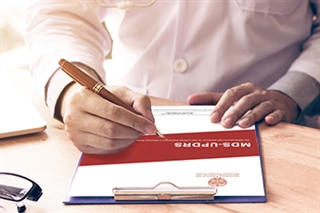 VOLUME 26, ISSUE 2 • June 2022. Full issue »
VOLUME 26, ISSUE 2 • June 2022. Full issue »

Validation of the Arabic Version of the Movement Disorder Society-Unified Parkinson's Disease Rating Scale
 The International Parkinson and Movement Disorder Society (MDS)-Unified Parkinson’s Disease Rating Scale (MDS-UPDRS) has become the gold standard for evaluation of multiple key aspects of Parkinson’s disease (PD) in clinical practice, research, as well as in clinical trials.
The International Parkinson and Movement Disorder Society (MDS)-Unified Parkinson’s Disease Rating Scale (MDS-UPDRS) has become the gold standard for evaluation of multiple key aspects of Parkinson’s disease (PD) in clinical practice, research, as well as in clinical trials.
To ensure consistency of ratings across a diversity of cultures around the world in the ever-growing international research landscape, MDS has launched a rigorous program for translation and validation of the non-English versions of the MDS-UPDRS.
Arabic is the native language of 28 nations with a population of almost 242 million people. In fact, it is one of the most widely spoken languages in the world; therefore, Arabic has been adopted as one of the official languages of the World Health Organization (WHO). The main aim of the study was to validate the Arabic translated version of the MDS-UPDRS and to assess its factor structure compared with the English version. Accordingly, the MDS-UPDRS was translated into Arabic.
The Arabic version was tested in over 400 native Arabic speaking PD patients from eight Arabic speaking countries. These countries included Bahrain, Egypt, Jordan, Kuwait, Palestine, Tunisia, Saudi Arabia, and United Arab Emirates. This also included a big team effort of more than 35 clinicians and researchers. According to the study that was published in Movement Disorders in 2022, “the Arabic version demonstrated good validity and utility in Arabic-speaking patients with PD and has been thereby designated as an official MDS-UPDRS version.”
This study is significant for several reasons; although Arabic speaking health-care professionals have a basic understanding of the English language (written and spoken), it would be difficult to administer clinical tools, such as the MDS-UPDRS, to the Arab population without translating it into their native Arabic language.
Benefits of translating the MDS-UPDRS into the Arabic language will reach millions of individuals worldwide, including health-care professionals and PD patients.
This will greatly enhance the networking and research collaboration potential between all Arabic speaking countries worldwide.
In addition, it will unify PD clinical assessments eventually improving patient outcomes. The availability of the Arabic version of the MDS-UPDRS now allows for large clinical trials that use the scale as a pivotal outcome to include study sites, investigators and patients from these countries when new treatment protocols emerge.
Overall, the data collection methodology among Arabic speaking countries across two continents of Asia and Africa provide a road map for validating additional MDS rating scale initiatives. There is strong evidence that underserved regions can be mobilized to promote efforts that apply to better clinical care, education and research for PD. These efforts are very much needed in the Arabic countries where it is believed that the prevalence of PD is similar to what is reported worldwide. Yet, the fields of PD and movement disorders are however underdeveloped and underserved in the region.
Learn more about the MDS Translation Program:
Read more Moving Along:






